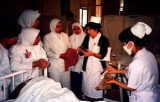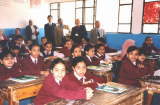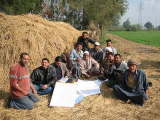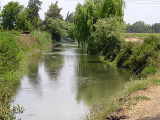|
→عربي
Economic Cooperation (
Official Development Assistance, ODA )
Technical Cooperation
Technical Cooperation is aimed at the development of human
resources who are technically capable of playing a positive role
in the national task of economic and social development. It
provides an excellent opportunity for developing countries to
acquire Japan's technology, knowledge and know-how. Different
schemes of Technical Cooperation are carried out by the Japan
International Cooperation Agency (JICA), and include Training
Programs, Dispatch of Japanese Experts, Project-Type Technical
Cooperation, and Development Studies, Japan Oversea Cooperation
Volunteers. Under these schemes, we conduct various programs in
Egypt as follows;
Training Programs
Egyptian trainees are invited to Japan for appropriate training on
the most up-to-date and special knowledge and technology in a
wide variety of fields, ranging from agriculture, health and
medical care to manufacturing and transportation. Up to the end of
Fiscal Year 2003, 4,483 trainees had been invited to Japan. In FY
2004, approximately 128 trainees were invited.
Third Country Training Programs (TCTP) are also carried out in
Egypt, with Egypt being a training implementation country,
accepting trainees from African and Middle Eastern countries,
while Japan sends experts (lecturers) and bears the training
expenses. In FY 2004, some programs are on-going as follows: Rice
Cultivation Techniques, Introduction to Molecular Biology, Animal
Production and Health, Medical Technical Cooperation (for Iraqis),
and Technical Cooperation on the electricity field (for
Palestinians).
Dispatch of Japanese Experts
Many Japanese experts have been dispatched to Egypt to transfer
their know-how and expertise to their Egyptian counterparts. In FY
2003, 50 experts were dispatched in such fields as Education, Trade, Industry,
Irrigation and Environment.
Project-Type Technical Cooperation
As a comprehensive approach to promoting technology transfer, the
Japanese government undertakes Project-Type Technical Cooperation.
They are implemented on a basis of several-year planning as a combination of the three basic types of cooperation
schemes- namely, training in Japan, dispatch of long-term and
short-term experts, and provision of equipment and machinery. In
Egypt, 3 projects are underway, such as Improvement of Science and
Mathematics Education in Private Schools, Foreign Trade Training
Center (phase2),The
Water Management Improvement Project in the Nile Delta.
In recent years, there have been many cases of this type of
technical cooperation being supported by grant aid, with Japanese
grant aid being used to fund the construction of facilities and
provision of equipment to carry out project-type technical
cooperation. Among such examples are Environment Monitoring
Training Project and Pediatric Emergency Care Project.
>> Also see: Table
of Project-Type Technical Cooperation in Egypt until 2004
Development Studies
In order to assist developing countries in formulating development
plans, the Japanese government has introduced Development Studies.
Under this scheme, study teams are dispatched to recipient
countries several times to gather information and data for
official development planning.
The information and data are summarized in a report which provides
important guidelines in the drafting of development policy by the
government of the country concerned. The report is also used in
requests for financial and technical assistance to implement the
development plan. Since fiscal year 1998, detailed design studies
have been carried out with the collaboration between the Japan
International Cooperation Agency (JICA) and the Japan Bank
International Cooperation (JBIC) in connection with
projects yen loans.
Japan Overseas Cooperation Volunteers and Senior Volunteers
Since 1996, a new program was introduced to Egypt, "Japan Overseas
Cooperation Volunteers (JOCV)" and in 2002, Senior Volunteers (SV)
have been dispatched. Under this scheme, young and experienced
Japanese volunteers are dispatched to work in rural areas of
Egypt. They make technical contribution in fields like nursery,
youth activity, computer programming, and sports, by living with
the people there. In this way, they deepen the understanding and
friendship between the two peoples of Japan and Egypt. Currently,
30 (24 JOCVs and 6 SVs) volunteers are working in such field as
athletics, vocational training, mechanics, Japanese language, and
kindergarten teaching and other fields.
Project for the Higher Institute of Nursing, Cairo University

click the photo for larger image |
The Higher Institute of Nursing (HIN) at Cairo University has
played a vital role in producing educators of nurses, leading
nursing administration and head nurses at hospitals since its
establishment in 1964, in order to cope with the short fall of
nurses compared to doctors in Egypt. However, due to the
limited educational facilities of the old HIN, it could not
live up to the demand of the Egyptian society.
Japan therefore provided new facilities for HIN, including the
school building and the dormitory building, in the form of
grant aid. Using these new facilities, Japan carried out
project-type technical cooperation from April 1994 to March
1999, in order to help HIN graduate more nurses and provide
more well-trained nurses. |
In this example of
project-type technical cooperation, 23 teaching staff were trained
in Japan, and 40 Japanese experts (7 long-term and 33 short-term
experts) have been dispatched. In addition, workshops and seminars
have been held 5 to 6 times per year for the teaching staff.
Moreover, Japan has donated some educational equipment, including
AV hardware, books for the library and so forth.
Through the cooperation, the HIN has dramatically improved,
reflected in the fact that the number of students increased from
536 in 1994 to 819 in March 1999.
This is one of the most successful projects of Japan's ODA,
showing the effective synergy between the technical cooperation
and grant aid.
Improvement of Science and Mathematics Education in Private
Schools
|
JICA (Japan International Cooperation Agency) made science and
mathematics guidebooks for teachers in primary schools in 2000
in cooperation with NCERD (the National Center for Educational
Research and Development). They contain problem-solving
mathematics exercises and hypothesis-to-experiment science.
JICA, in collaboration with NCERD, started the second phase of
this project in 2003, conducting training for teachers using
the guidebook at four selected experimental schools in Cairo
governorate. |

click the photo for larger image |
The Water Management Improvement Project in the Nile Delta


click the photo for larger image |
This project was implemented within the framework of the
Irrigation Improvement Project (IIP) launched in 1999. The
advantage of this project is the full-scale participation of
farmers. The project succeeded in alleviating the shortage of
water at tail ends, resulting in an increase of crop yields in
the Nile Delta.
|
→Japan's
Assistance to Egypt's Top |
